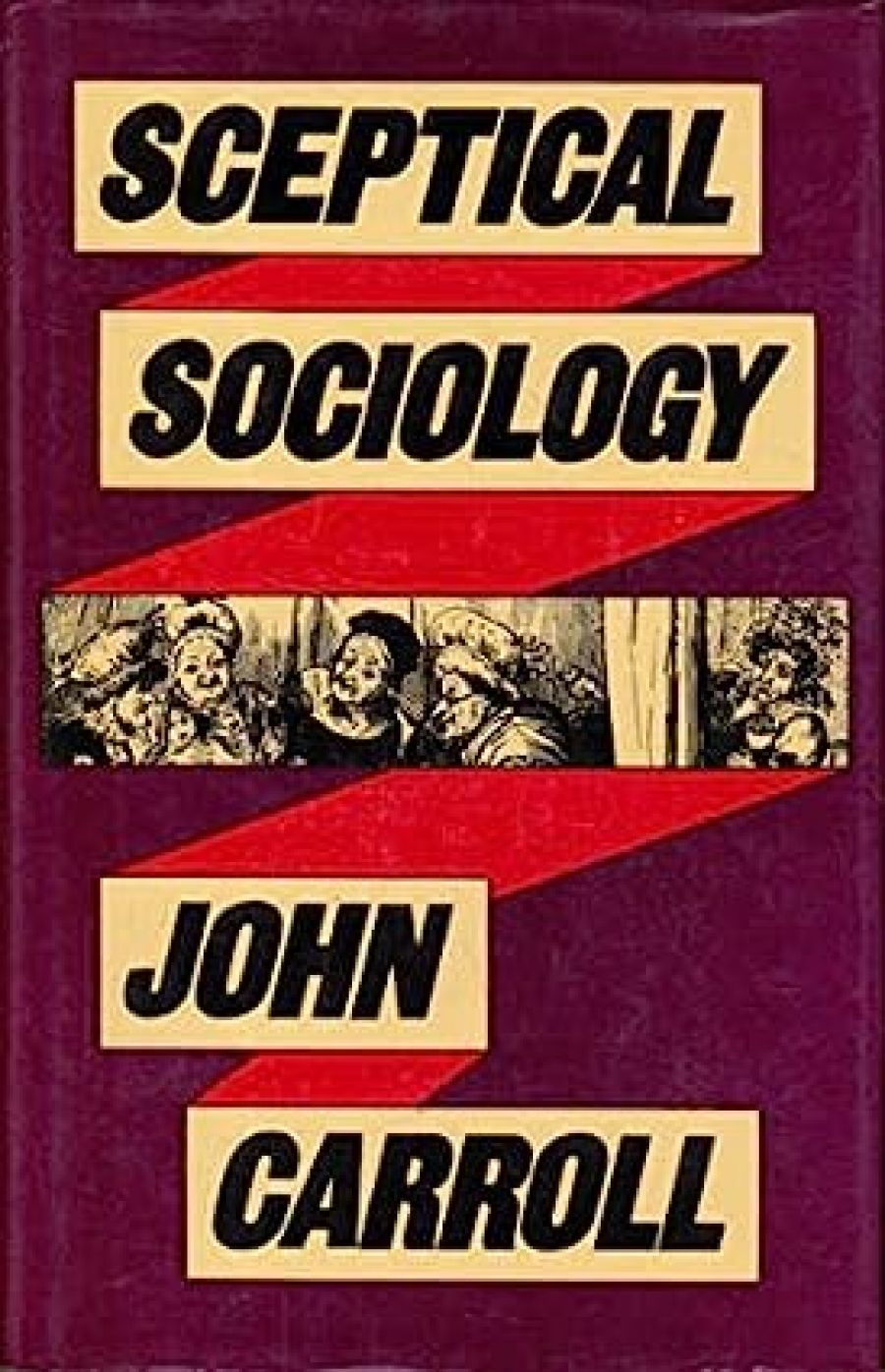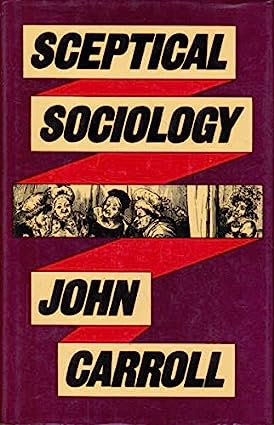
- Free Article: No
- Contents Category: Reviews
- Review Article: Yes
- Article Title: A Spengler from Moonee Ponds
- Online Only: No
- Custom Highlight Text:
Sceptical Sociology is really a set of essays, some of them previously published, by the Reader in Sociology at La Trobe University. It contains a long introductory piece which gives the book its title, a concluding confession, and a number of vignettes which Carroll calls ‘stories’. The book as a whole is a display of the perversity of brilliance.
- Book 1 Title: Sceptical Sociology
- Book 1 Biblio: Routledge & Kegan Paul, $29.95, 201pp
- Book 1 Cover Small (400 x 600):

- Book 1 Cover (800 x 1200):

Fortunately, the book contains far more subtle and more serious essays. ‘Shopping World’, ‘The Soap Fetish’, ‘The Tourist’ and ‘On Homecoming’ are works by a brilliant stylist and profound thinker who avoids dogmatism by blending personal observation with an eclectic use of sociological and psychoanalytic theories.
The best essays stand here in a line of great sociological essayists which include Simmel, Mead, Goffman, and Parsons. They bring to Australian intellectual life a new level of reflectiveness, modesty, and sophistication, although their methodological inspiration is a combination of the sociological imagination of late Wilhelmine Germany and the ‘applied psychoanalysis’ practised by Freud’s early circle. Little wonder that the year 1918 possesses greater symbolic importance for Carroll.
His previous books – Break-Out from the Crystal Palace (1974) and Puritan, Paranoid, Remissive (1977) – were tightly argued, disciplined works of scholarship on large themes. By delineating the ‘anarcho-psychological tradition’, the first book made an original contribution to the historiography of ideas. The concept of ‘remissive culture and personality’ in the second book was a brave contribution to the sociology of post-Puritan culture.
Sceptical Sociology, by contrast, is a set of guerrilla essays by a complex thinker in search of a framework; clearly a transitional work. The book’s main difficulty is whether the diverse contents are genuinely supported and defended by the title essay or introduction.
The book represents either disillusionment with the genres previously employed to support the author’s unusual brand of New Conservatism, or it is a more relaxed exploration of particular, important topics. The new approach is more (vulgarly) self-revealing, but it possesses the virtue of humility. Carroll demonstrates and awareness of the intractable mystery in everyday social life and interaction, and offers a serious critique of the ease with which much sociology reifies, dehumanises its subject matter.
The title essay might have been called ‘Sceptical of Sociology’. It rehearses in a racy, almost carefree manner three temptations which have invalidated much sociology: ‘science’, ‘idealism’, and ‘social relevance’. Believing sociology to be a ‘creaking skeleton’, Carroll urges sociologists to seek merely ‘a little to laugh at, a little to blush at, in our world’ – especially themselves.
While his sense of the need for rootedness in the common social life is refreshing, Carroll’s essay as a whole seems stale, belated. Such polemic against other sociologists is endemic to the subject’s history, notwithstanding Parsonian and other attempts to create an empirical and theoretical consensus in the discipline.
To call for a new start in sociology is tiresomely fractious. Carroll’s ‘scepticism’ goes beyond scepticism of academic sociology: it is a general philosophical stance. His mentors are an exquisite bunch of Intellectual Allsorts: Tocqueville, Marx, Weber, Durkheim at a pinch, but not Simmel or Mead; Freud and his successors, such as Rieff; eighteenth century sceptics, empiricists, satirists and romantics including Hume, Johnson, Pope and Burke; and finally the ‘gay pungency’ of Nietzsche.
Such mentors save Carroll from dullness, to be sure, and immunise him against simple-minded conservatism. But they undermine the personalistic would-be charismatic nature of the vision (or nightmare) he intends to convey. His key interest – the spiritual and aesthetic malaise of consumerism – is treated with great compassion and insight, but it lacks theoretical articulation, especially in the title essay. It is not that Carroll lacks theoretical power, but rather that his manifesto embodies merely a misplaced faith in professional sociology and its redemption.
The obvious theoretical dexterity found in the essays appears as a personal gift rather than a theoretical program, agenda, or curriculum in which others can share. One sympathises with his doubt that critical logic can be taught in contemporary educational institutions. But his despair is compounded by his professing to reject all sociology since 1918. As many silly thinkers little the history of pre-1918 sociology as post-1918 sociology. The interesting sociological thinkers, before and after, are general philosophical and moralistic observers for whom sociology was an avocation. To reject sociological since 1918 is to reject – legitimately but evasively – sociology as an academic or social-administrative profession. Such caprice induces its own scepticism in the reader.
The book contains no evidence that Carroll’s fundamental humanistic and historical values have changed since his last book’s modernistic lament for the Puritan past. He remains a Spengler from Moonee Ponds, trapped in a framework of high-cultural determinism. Lacking an eschatology, he is tempted to indulge in cosmic laughter.
For him, as for most of us, the way beyond modern consumer culture and its tragicomedy remains impenetrable. Meanwhile, Carroll appears to have joined other relics of the Sixties when he ruefully remarks:
We [sceptical sociologists] don’t except too much: we shall not overcome, the world will not be shaken by us, nor will individual lives. We represent one type of contemporary narcissist, trying to have some fun, or stay sane, in our own particular way, trying to turn our compulsion to control the world through writing about it into a kind of flirtation with ourselves and, if we are lucky, with some others.


Comments powered by CComment